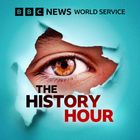
The History Hour
Oct 8, 2022
A collection of this week's Witness History programmes, presented by Max Pearson. The guest is Dr Emily Zobel Marshall. She explains the rise of festivals around the world celebrating Caribbean culture.
In 1962, Nigerian man Phil Magbotiwan opened a brand new nightclub in Manchester, UK. In part because of his own personal experiences of racism, Phil wanted to create somewhere where everyone would be welcome – Manchester’s first racially inclusive nightclub. The Reno was born. Phil’s youngest daughter, Lisa Ayegun has been speaking to Matt Pintus about the venue. This programme contains descriptions of racial discrimination.
We also hear about how an Israeli solider was brought back home after spending five years in captivity in Gaza, the fall of Slobodan Milosevic and how a low budget film staring musician Jimmy Cliff brought reggae to the world.
(Photo: A woman having a good time at Claudia Jones' Caribbean carnival, at St Pancras Town Hall in London, 1959. Credit: Daily Mirror via Getty Images)

